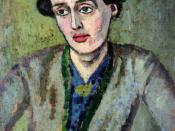The term modernism refers to the radical shift in aesthetic and cultural sensibilities evident in the art and literature of the post-World War One period. The ordered, stable and inherently meaningful world view of the nineteenth century could not, wrote T.S. Eliot, accord with "the immense panorama of futility and anarchy which is contemporary history." Modernism thus marks a distinctive break with Victorian bourgeois morality; rejecting nineteenth-century optimism, they presented a profoundly pessimistic picture of a culture in disarray. In literature, the movement is associated with the works of (among others) Eliot, James Joyce, Virginia Woolf, W.B. Yeats, Ezra Pound and Franz Kafka. In their attempt to throw off the aesthetic burden of the realist novel, these writers introduced a variety of literary tactics and devices: the radical disruption of linear flow of narrative; the frustration of conventional expectations concerning unity and coherence of plot and character and the cause and effect development thereof; the deployment of ironic and ambiguous juxtapositions to call into question the moral and philosophical meaning of literary action; the adoption of a tone of epistemological self-mockery aimed at naive pretensions of bourgeois rationality; the opposition of inward consciousness to rational, public, objective discourse; and an inclination to subjective distortion to point up the evanescence of the social world of the nineteenth-century bourgeoisie.
(Barth, "The Literature of Replenishment" 68) The modernism of the great fiction writers along with Virginia Woolf was in part a strategy of cultural resistance to dominant mainstream, middle-class, and realist habits. The "Shock of the New" renewed perception and transformed conceptions of everyday life. The boundary lines erected by realist views were blurred by modernist narratives. The borders between the flow of inner experience and outer reality, for example, became permeable, as stream of consciousness became a defining gesture as...


